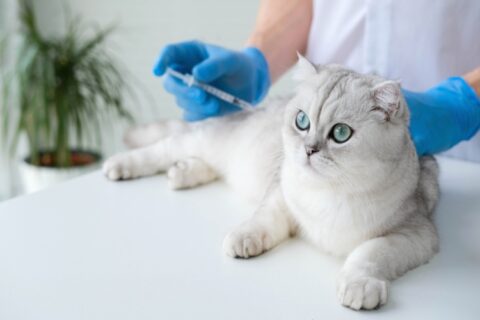Cat Dental Care and Cleanings
Eight out of 10 cats over the age of three have some form of dental disease. Tooth decay and gingivitis may be common among cats and dogs, but these problems are not normal or healthy. Luckily, tooth and gum issues are largely preventable. Adopt a dental health routine for your feline friend to help minimize the risk of dental disease as your pet gets older.
Why is Cat Dental Care Important?
You may argue that cats in the wild don’t clean their teeth, so why should domestic felines? Actually, wild cats chew on grass and bones, which naturally clean their teeth. Since housecats often don’t have a suitable alternative, pet owners must intervene.
Failure to keep your cat’s teeth and gums healthy could lead to plaque buildup. Eventually, this gooey coating hardens into tartar, which irritates the gums and leads to gingivitis and tooth loss. Bacteria from oral infections can even enter the bloodstream, damaging the kidneys and other vital organs. If the tartar buildup becomes severe enough, tooth extraction may become necessary.
How to Check Your Cat’s Oral Health
Animals may not be able to tell us in words that they’re hurting, but careful observation can reveal a lot about your pet’s oral health. Here are some signs that your cat requires dental care:
- Difficulty eating or drinking
- Pawing at the face
- Excessive drooling
- Weight loss
- Halitosis (bad breath)
- Discolored, dirty, or chipped teeth
- Red, swollen, or bleeding gums
- Sores or lesions anywhere inside the mouth
Tips to Keep Your Cat’s Teeth and Mouth Clean
Don’t allow your pet’s oral health to deteriorate—take a proactive approach to keep the teeth and gums healthy for years to come. Here are the steps you should take to keep your pet’s mouth clean and promote good oral health.
- Brushing: Brush your cat’s teeth daily (or at least twice weekly) with a rubber toothbrush, “finger glove,” or piece of gauze covered in fluoride-free cat toothpaste. Your feline companion may not particularly enjoy the experience, so if you have any trouble, ask your vet for advice.
- Specially formulated treats: Ask your vet what products they recommend to remove plaque, control tartar buildup, and freshen your cat’s breath.
- Dental sprays or water additives: These products are designed to manage your cat’s plaque and tartar levels.
- Professional dental cleanings: Bring your cat to the vet once a year for a health checkup and dental cleaning. This can be performed with anesthesia or without anesthesia, depending on your pet’s health. Your veterinarian will help advise you.
At Reed Animal Hospital, we treat our customers’ pets as if they were our own. Our veterinary dental services are intended to help your pet live a longer, happier, and healthier life. To learn more about what cleaning your cat’s teeth entails, please call us in Campbell, CA at 408-369-1788 or in Saratoga, CA at 408-647-2906. You can also request an appointment online.

